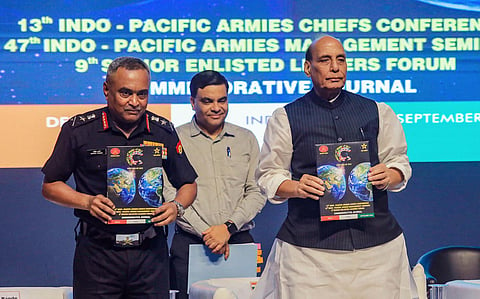

NEW DELHI: Defence Minister Rajnath Singh underlined the rising profile of the Indo-Pacific region on Tuesday, saying it is no more a maritime construct, but a full-fledged geo-strategic construct, and the region is facing a complex web of security challenges including boundary disputes and piracy, which need a collaborative approach.
Speaking at the 13th Indo-Pacific Army Chiefs Conclave (IPACC), he explained the prevailing situation in the region recalling the theoretical model by American author Stephen R Covey, which is based on two circles -- 'Circle of Concern' and 'Circle of Influence'.
"There may be instances when the 'Circle of Concern' of different nations overlap with each other. International maritime trade routes passing through high seas, beyond the exclusive economic zones of any country, are relevant examples," he said.
"This can either result in conflict between nations or they can decide to coexist by mutually deciding the rules of engagement. The concept of these circles underscores the importance of strategic thinking and prioritisation," he added.
To deal with the prevailing situation in the region, Rajnath pointed out that states must recognise that global issues involve multiple stakeholders and no one country can address these challenges in isolation.
He termed the United Nations Convention on the Law of the Sea (UNCLOS), 1982 as a good example of such an international agreement which establishes the legal framework for maritime activities and addresses the issues arising from overlapping 'Circles of Concern' of different nations.
Rajnath also pointed out that states, at the same time, must identify and seek to expand their 'Circle of Influence' to promote national interests on the global stage.
"This conference is an exercise where we all are trying to expand our 'Circle of Influence' while harmonising the overlaps of our 'Circle of Concern'," he added.
The Indian Army Chief General Manoj Pande and the Chief of Staff of the US Army General Randy George held a joint press conference and spoke about the conference and the region.
Emphasising the significance of the Indo-Pacific region, the US Chief of Staff on Tuesday said it is the reason why the US Army is conducting exercises in this region more than anywhere else in the Pacific.
The integrated theatre formed combining the Indian Ocean and the Pacific Ocean, and the land masses that surround them are termed as the Indo-Pacific.
The conspicuous geo-political and geo-economic significance of the Indo-Pacific can be understood from the fact that the region accounts for 65 per cent of the world's population, 63 per cent of the global GDP and 50 per cent of the world's maritime trade.
Speaking at the joint briefing of the 13th Indo-Pacific Army Chiefs Conclave (IPACC) in the presence of Gen Pande, Gen George said: “This (Indo-Pacific) region is critically important to us. I think you have seen that with our national defence strategy, this is a priority.... That's why we are out here and why we exercise more than anywhere else in the Pacific...”
“What this conference proves is that what we are after here is unity and commitment and the strength we can provide to all partners and allies. What we are focused on is building that with the countries that are here,” the US Army chief added further.
The Indian Army and the United States Army are co-hosting the 13th IPACC, 47th IPAMS and 9th SELF, a three-day conference of chiefs of armies and delegates of 40 countries in New Delhi from 25th to 27th September.
In reply to a question, Gen Pande said: “Let me upfront mention that we are not looking at a military alliance so to speak... It's not... this entire exercise initiative is not directed at a country or a group of countries.”
Talking about the 13th edition of IPACC, Gen Pande said: “Cooperation amongst our land forces is a critical component of the collective response through bilateral and multilateral engagements between components of armed forces of nations have been ongoing...the theme of this year's event ‘together for peace, sustaining peace and stability in the Indo-Pacific region’ resonates deeply with the idea of a secure, stable, free open and inclusive Indo-pacific which provides opportunities for growth of all nations.”
"The Indo-Pacific construct has come to occupy central space in the contemporary geo-strategic campus in recent years. Its significance is a reflection of evolving dynamics in the political security, economic and environmental domains of today's world,” he added.